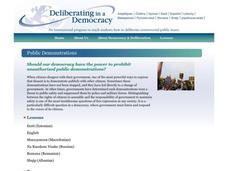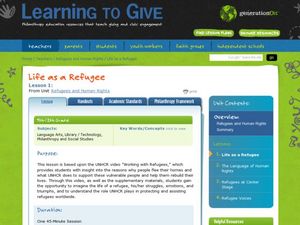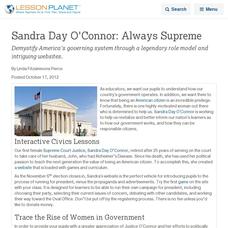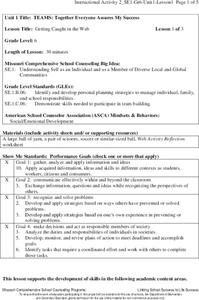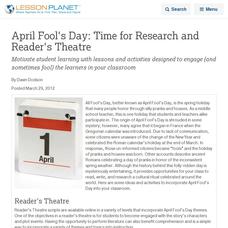Center for Civic Education
Orb and Effy Learn About Authority
Simplify the teaching of the US Constitution with this primary grade social studies lesson. While reading a fun story about an imaginary place called Bubble Land, children learn about the concept of authority and the importance of...
Center for Civic Education
What Basic Ideas About Government Are Included in the Preamble to the Constitution?
Young historians explore the meaning of the Preamble to the US Constitution in this upper-elementary social studies lesson. Working with partners or in small groups, children discuss the purpose of government before reading and analyzing...
Curated OER
What is the Federal System Created by the Constitution?
Explore the unique structure of the federal system of government in the United States. Class members will learn about how most nations were organized before the establishment of the Constitution, how power is currently divided...
Curated OER
What is Meant by Returning to Fundamental Principles?
What did the Founding Fathers mean by the importance of continually returning to fundamental principles? Your young historians will analyze a series of quotations illustrating the fundamental ideals and principles of the...
Deliberating in a Democracy
Public Demonstrations
Have you ever fought publicly for an idea you believe in? Scholars research and analyze the right to demonstrate peacefully. Incorporating different real-life scenarios as well as legal decisions exposes the concept of democracy and free...
Center for History and New Media
Slavery and Free Negroes, 1800 to 1860
What was life like for enslaved and free black people before the American Civil War? Explore the building tension between states and the freedom of individuals with a thorough social studies lesson. Learners of all ages explore...
Center for History and New Media
A Look at Virginians During Reconstruction, 1865-1877
The transition between rebellion to reunification was not smooth after the Civil War. Young historians compare primary and secondary source documents in a study of the Reconstruction era in Virginia, noting the rights that were not...
Center for History and New Media
The Impact of the Jim Crow Era on Education, 1877–1930s
Even though American slaves were officially emancipated in 1865, the effects of slavery perpetuated throughout the 19th and 20th centuries. Middle and high schoolers learn about the ways that discrimination and the Jim Crow laws...
Curated OER
Woodrow The White House Mouse
Inauguration Day is January 20. Implement an entire week's worth of mini activities to help young historians become knowledgeable of the President's job, the executive branch, and the White House. The worksheets focus on...
Curated OER
Life as a Refugee
Lesson 1 from a Refugees and Human Rights unit is based on the UNHCR video “Working with Refugees.” Pupils gain an understanding of the role the United Nations plays in protecting and assisting refugees worldwide and have an opportunity...
Curated OER
Sandra Day O'Connor: Always Supreme
Demystify America's governing system through a legendary role model and a fabulous website.
Curated OER
Barnyard Protest: Cows, Chickens & Fundamental Freedoms
Here is an ambitious and engaging lesson that should help elementary schoolers begin to develop a basic understanding of human rights. Pupils are asked to think about their own rights, the rights of others, and how an individual's voice...
Canadian Civil Liberties Education Trust
That’s Not Fair!
As part of a series of critical thinking exercises, kids consider issues of social justice, especially the factors that must be considered when trying to balance conflicting rights and freedoms.
Curated OER
We Must Not Be Enemies: Lincoln's First Inaugural Address
Learners complete a unit of lessons on the historical context and significance of Lincoln's inaugural address. They analyze archival documents, campaign posters, historical photographs, and primary source documents, and listen to songs...
Facing History and Ourselves
Do You Take the Oath?
Why did so many go along with Nazi policies during World War II? An investigatory unit includes four handouts, reading analyses, classroom discussion topics, and intriguing philosophical questions, helping learners understand the...
Missouri Department of Elementary
Getting Caught in the Web
When it comes to teamwork, it's best not to drop the ball. Pupils stand in a circle, tossing around a ball of yarn to one another to create a web. Next, they use teamwork skills to keep a soccer ball from falling off the web before...
Curated OER
The Black Death and HIV/AIDS: Which is the Worse Plague?
Exploring the similarities and differences between the Black Death and HIV/AIDS, students write persuasive essays answering which is the "worse plague." This cross-curricular activity between Language Arts and Social Studies addresses...
Curated OER
It Has Been Rubbish For Years
Students are presented with the problems of percentages and focus upon numbers in contrast to 100. They calculate problems with money and are engaged with the use of games as a teaching tool. Students also interpret data as presented in...
Curated OER
Indiana Applied Skills Assessment Sample
For this Applied Skills Assessment worksheet, 5th graders complete a sample state assessment for Language Arts and Mathematics for 5th graders. They read a writing prompt and complete a writing activity that follows, answer various types...
Curated OER
"Circles of Strength: What Do You Stand For?" ~ A Reflection of Us~
Middle schoolers determine how they are included in "Circles of Strength." In this character activity, students reflect on how they are part of "Circles of Strength" in the "Circle of Life." They make an individual circle that includes...
Deliberating in a Democracy
Euthanasia
Learners analyze euthanasia as a possible way to die. In this controversial lesson, students reflect and discuss euthanasia as a possible way to enter death. Classroom discussion allows learners to voice their opinion and...
Curated OER
Happy April Fool's Day!
Grab students' attention with these lesson and activity ideas on April Fool's Day.
K12 Reader
Three Levels of Government
Help your learners work their way through a reading assignment for informational text. Using context clues, they answer five comprehension question based on a short passage about the three levels of government: local government, state...
National Endowment for the Humanities
Revolution '67, Lesson 1: Protest: Why and How
To some people, protesting is as American as apple pie, but the factors that lead to protests can be as confusing to veteran activists as to today's youth. Revolution '67 explores the riots in Newark, New Jersey as a case study. ...






